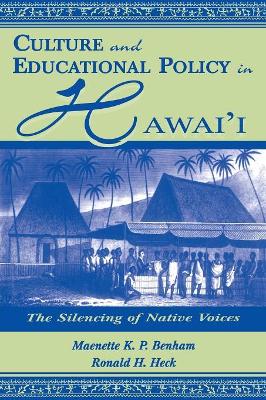Sociocultural, Political, and Historical Studies in Education
2 total works
Culture and Educational Policy in Hawai'i
by Maenette Kape'ahiokalani Padeken Ah Nee- Benham and Ronald H Heck
This comprehensive educational history of public schools in Hawai'i shows and analyzes how dominant cultural and educational policy have affected the education experiences of Native Hawaiians. Drawing on institutional theory as a scholarly lens, the authors focus on four historical cases representing over 150 years of contact with the West. They carefully link historical events, significant people, educational policy, and law to cultural and social consequences for Native Hawaiian children and youth.
The authors argue that since the early 1800s, educational policy in Hawai'i emphasizing efficiency has resulted in institutional structures that have degenerated Hawaiian culture, self-image, and sovereignty. Native Hawaiians have often been denied equal access to quality schools and resulting increased economic and social status. These policies were often overtly, or covertly, racist and reflected wider cultural views prevalent across the United States regarding the assimilation of groups into the American mainstream culture.
The case of education in Hawai'i is used to initiate a broader discussion of similar historical trends in assimilating children of different backgrounds into the American system of education. The scholarly analysis presented in this book draws out historical, political, cultural, and organizational implications that can be employed to understand other Native and non-Native contexts. Given the increasing cultural diversity of the United States and the perceived failure of the American educational system in light of these changes, this book provides an exceptionally appropriate starting point to begin a discussion about past, present, and future schooling for our nation's children. Because it is written and comes from a Native perspective, the value of the "insider" view is illuminated. This underlying reminder of the Native eye is woven throughout the book in Ha'awina No'ono'o--the sharing of thoughts from the Native Hawaiian author.
With its primary focus on the education of native groups, this book is an extraordinary and useful work for scholars, thoughtful practitioners, policymakers, and those interested in Hawai'i, Hawaiian education, and educational policy and theory.
The underlying assumption is that a critique of the substantive, theoretical, and methodological issues involved in studying policy can help researchers conduct policy studies that are more informative in guiding policy development and more effective in assessing the impact of policy reforms.
*Part I acquaints readers with substantive issues and challenges related to the study of the policy process, and includes chapters on federalism and policymaking, and on studying policy development, implementation, and impact.
*Part II examines different conceptual frameworks and theories for the study of policy, with chapters on political culture and policymaking, the punctuated-equilibrium theory and the advocacy coalition framework, economic and organizational perspectives, and new approaches (e.g., feminism, critical theory, postmodernism).
*Part III focuses research methods for studying policy, covering research design, qualitative methods, multilevel methods for policy research, and growth modeling methods for examining policy change.
*Part IV compares the diversity of approaches used by policy scholars with respect to their strengths and weaknesses, and presents a number of issues for further consideration in conducting policy research.
This introduction to theories and methods of conducting policy research is intended to give prospective researchers an appreciation of the relationship among policy problems, empirical methods, and practice, and to contribute to building their skills in conceptualizing and conducting policy research that answers important questions. The text includes examples of studies to illustrate the diversity of methodological techniques, and discusses issues related to the design and conduct of original educational policy studies.
Studying Educational and Social Policy: Theoretical Concepts and Research Methods is designed primarily for graduate courses in educational policy and educational research and is appropriate as well for research methodology courses in other disciplines, including statistics and research methodology in the social sciences, organizational studies, public policy, and political science

